QuestionI have three shepards a 3 yr old female just had pups 3 moths ago and two 1 1/2 year olds one male one female. About three weeks ago the two females ribs started to show and waist and hip became very prominent. The male looks fine. I had them dewormed last month. Eating is normal. Urine and Feces is normal and on a regular. They are still active a do their daily walks fine. They just look ill.I started giving them boiled ground beef on there food or a few boiled eggs to help put some weight on them. They look better but the day after I put them back on just chow and canned they look thin again.
Also my younger female daughter to older female is very timid and scarred of mother, she was the skittish one of the litter but grew out of it other than this, she gets along fine with her brother and other dogs as well as human but she shutters when mom comes around whether mom pay her any mind or not she cower to the floor. Mom will growl at her or bite her back legs sometimes but never for any apparent reason. And not much when I am around but I will hear her and look out and mom has her pinned nudging her. Why can't I get them to get along?
AnswerYour concern for your thin pups a normal one. Pups can tend to look thin when growing, following the below is a good rule of thumb when concerned about weight.
1. Feed 3 - 4 times daily as required for age. Watch the pups eat so you know who is eating what. Never leave food out all the time because you are never sure what they are getting and they won't eat at mealtimes. Give them 15 minutes to eat then remove the bowl. This will teach your pups that meal time is mealtime and they eat when you put the bowl out or they go hungry. Going hungry a few times will teach your dog to eat when its given. Do this even with thin pups, within a day or so they'll eat at mealtime.
If my pups are still gobbling food at the 15 minute mark or if they run out and are still hungry, and I'm concerned about their weight, I give them more food and let them eat until they are full. I remove the bowl after mealtime.
2. For young pups, try adding water to the kibble, let it sit for 30 seconds. Mix it up, drain some of the water. The pups like the warm food and it makes a yummy gravy and helps with digestion and my dogs gobble it up.
3. Be sure that you place your dogs on a premium kibble for Large Breed Puppies. Regular puppy kibble is not the best thing for German Shepherd Pups because they increase their birth weight by 70 times in 15 months. I do not feed my dogs the same food say a Yorkie would eat it does not provide what they need.
Other things to consider when choosing a Puppy Kibble: Too much energy from fat can contribute to the acceleration of muscle and tissue development without the corresponding skeletal growth. This imbalance can lead to potential skeletal problems.
Ensure they are getting the right balance of phosphorus and calcium in their diets. Too much calcium is not recommended for large breed puppies it can affect their bones and joints.
4. I use Royal Canin Maxi for Large Breed Puppies up to 15 months and Royal Canin for German Shepherds after 15 months it is a little pricey but it is a Premium dog food designed especially for the needs large breed puppies and I feel confident my dogs are getting what they need. They come in 40 lb bags and I find that my dogs absorb more and need to eat less on this than other brands. Canin usually offers a buy 9 bags get the 10th free at retail outlets.
It meets unique growth requirements of the large breed puppy to keep his growth rate under control, high in protein, chicken and lamb ensure a limited energy supply while offering all the proteins your puppy needs to build strong bones and muscles. Balanced Calcium and phosphorus contents help build a solid skeleton and healthy teeth, natural sources of Glucosamine and chondrotin sulphate, (extracts from seafood and cartilage) promote sound joint development; It provides for digestive sensitivity of the large breed puppy which is still quite delicate; and also strengthens the puppy's immune system.
Doing the above will ensure your pups plump up in short order.
Some puppies can be naturally thin even when eating the required amounts and will fatten up as their growth rate diminishes.
One of my girls was one such dog. She was a runt. The skinny one of the litter. I was very concerned about her and I consulted with a vet when she got her shots and the vet recommended vitamin supplements (with no added calcium) and recommend she be on a large breed puppy food (which she was). It seemed that I got a different response from every expert I spoke to (people with 30 years experience with German Shepherds). Try enzymes maybe she's not getting the nutrients she needs. Try Vitamin C (it gives diarrhea if she gets too much) I followed their advice (at First) However, I discovered that as long as I provide my dog with the right dog food, ensure she's eating properly, her poops are good, she's been dewormed and has her shots, is vet checked, has no other problems, she is just fine.
She was skinny dog from day one, with plenty of energy to burn. I even treated her with roll over, Charlie bears, dehydrated liver often and daily while training, in addition to her mealtime food. People used to ask me if I fed her enough. She was a very skinny pup and I got lots of comments about her. It is common for some dogs to be thin while growing. Some American Breeds especially which are quite thin to begin with as opposed to the German Breeds which are heavier looking. She has filled out just fine as her growth slowed.
For More Information about the Special Dietary Needs of A German Shepherd here are some links:
Video on Dietary Needs Of A Germa Shepherd http://www.royalcanin.ca/library/files/dog/gs.wmv
Choosing the Right Formula For Your Dogs
http://www.royalcanin.ca/products/hn/choose_formula_en.php
QUESTION 2:
Your concern about the mother dominating the skiddish female pup.
Your dogs are part of a Pack. A puppy's first pack leader is his mother. From birth, puppies learn how to be cooperative members of a pack oriented society. At about three or 4 months after they're weaned, they fall into the regular pack structure and take cues from the pack leader - YOU. Not their mother. When you are not around, the mother then takes on the roll of a pack leader as she is second in command and disciplines and corrects the pack.
There could be a conflict in the way you lead as opposed to the way the mother leads. There is much to learn from a pack.
In nature, a pack leader makes rules and sticks to them - always correcting a violation of the rules. A pack couldn't survive without rules no matter what the species. In many human households, the rules, boundaries and limitations for the dog are unclear, or inconsistent if they exist at all.
Pack leaders always correct dogs that are misbehaving or not following the rules.
When the younger dog cowers and is down on the floor around the mom, she is in a submissive position. When the mother stands over the other dog and nips her she is showing her dominance and correcting her behavior. This is quite common in a pack.
My Second in Command - corrects my younger dogs in my absence. The more I understand them, the more I understand how strict a pack leader is with it's pack. The more strict I become with them in order to become a good pack leader myself.
I have one pup that my pack leader tends to correct the most. She is the one that does her own thing and does not listen as readily when asked to comply.
When I let my dogs out and they are ready to come in, I tap on the window and they all come running and sit outside the back door waiting for me to let them in, but one... well she continues to play. The others get annoyed because this holds them up from coming in the house. I don't let them in until they are ALL sitting at the back door. Eventually the one will stop playing and come and sit. So I let them in. But the Pack leader will growl and nip and this pup to correct her behavior.
Another example of my second in command correcting this pup is at my mealtime. Pack leaders always eat first in the wild, get the choice food and the pack waits at a distance until the pack leader is finished before they can eat. A pack would never rush the pack leader while eating. I follow this in my household too. But the young pups want to rush me because they smell the food I am eating.
I correct my dogs by showing my dominance over them, looking them in the eye, leaning towards them, pointing at them, or gently moving them where I want them while is say a fast authoritative Shhh. Used consistently, my dogs know this is a correction and that I am asserting my authority over them.
At my mealtime I do this to let the pup know his behavior is not tolerated. If the pup won't listen, the second in command will also correct her behavior by showing dominance, growling or nipping the pup who won't listen.
There are times, when I think my second in command is being harsh on the young dog in my presence. As the pack leader, I assert my authority over her to remind her that I am in command now, not you. But I do need to ask myself why the older one was correcting the younger one. There is usually a good reason for it, and it usually means that it's something I did not correct the dog for myself.
My dogs are well balanced my second in command is also very loving and patient with the pups, playing with them, encouraging them to play ball, cuddling with them.
Sometimes even at play the dogs will growl and nip but they do not hurt each other. One of my pups loves to play growl with the Pack leader - they sing back and forth with each other and when I've had enough I ask them to be quiet.
There is much to say about this, more than can be answered here. In order to learn more about the pack structure and how to become a good pack leader Caesar Millan has written some great books on this subject that are available at my bookstore at http://www.gallantshepherds.com/bookstore.htm
Wishing You all the best with Your Pups!

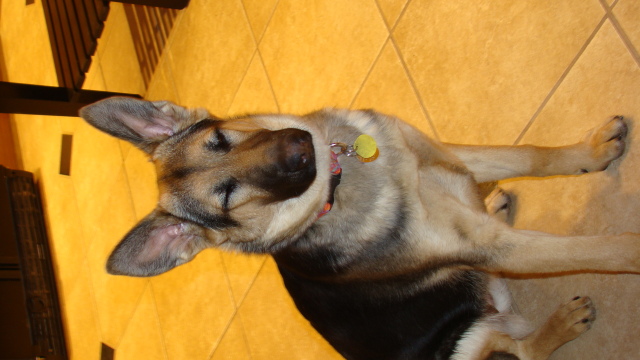 tymber
Question
tymber
ok my gsd is now 7 months old and i hav
tymber
Question
tymber
ok my gsd is now 7 months old and i hav
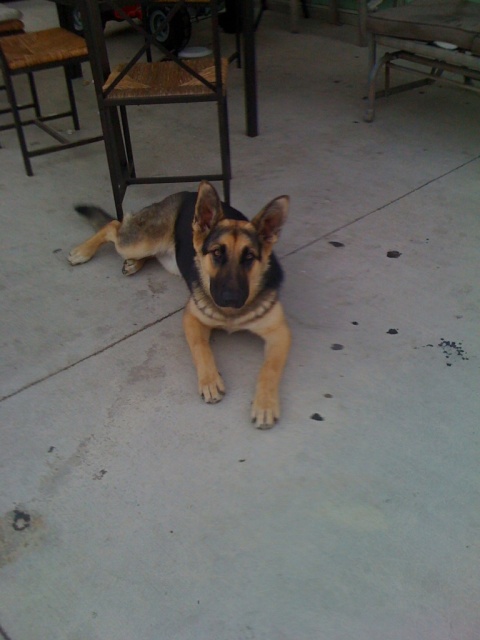 6 month pup
Question6 month old female
QUESTION: I was offer
6 month pup
Question6 month old female
QUESTION: I was offer
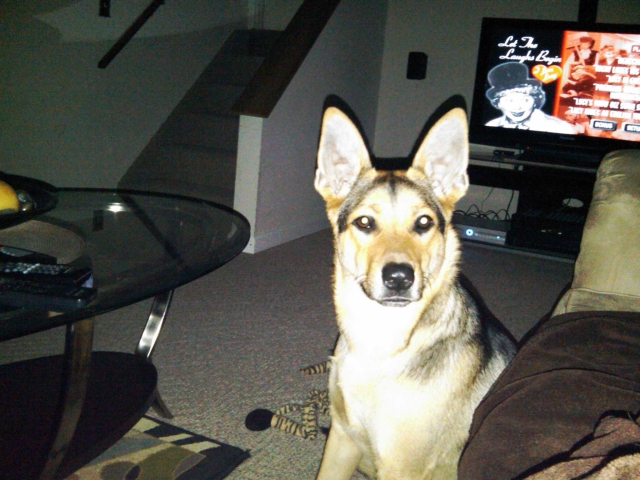 My German Shepherd Acts Scared
Question
Mannie
I have a male 1/2 German Shepherd 1/2 H
My German Shepherd Acts Scared
Question
Mannie
I have a male 1/2 German Shepherd 1/2 H
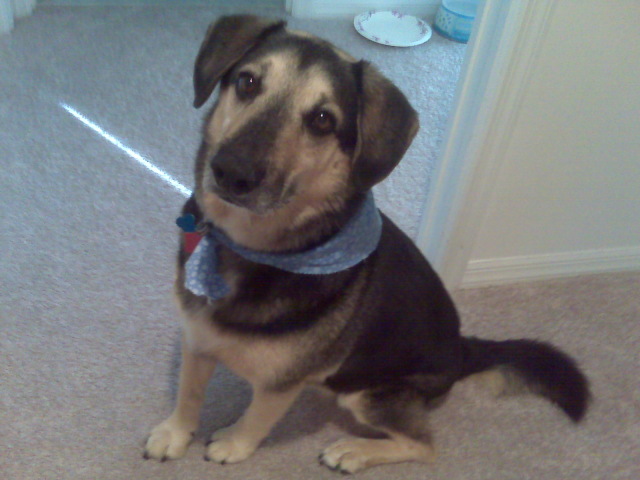 German Shepherd Mix Food
Question
Harley
Hello,
I have a 6 1/2 year old German S
German Shepherd Mix Food
Question
Harley
Hello,
I have a 6 1/2 year old German S
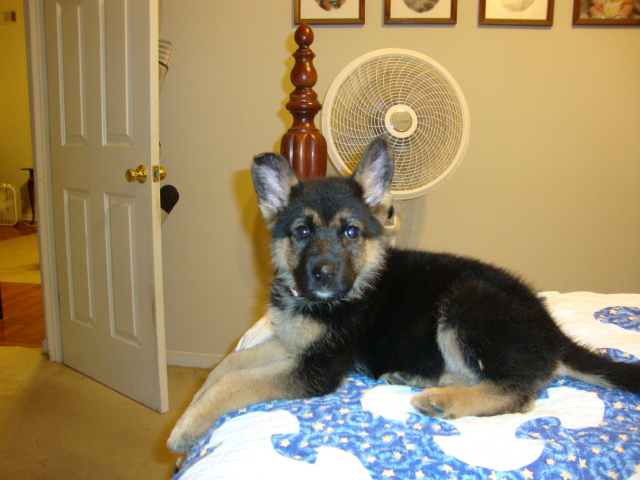 puppy wont eat
Question
ava 8weeksweeks
i have a purebred german sheph
puppy wont eat
Question
ava 8weeksweeks
i have a purebred german sheph